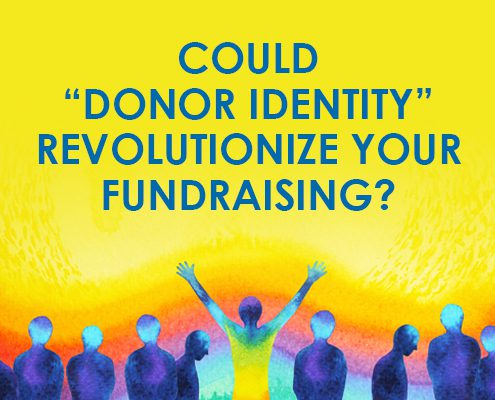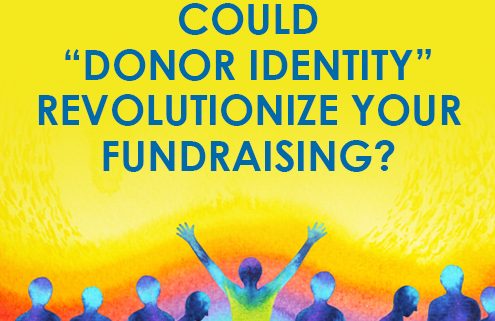Could Donor Identity Revolutionize Your Fundraising?

Drumroll please! My favorite new buzzword to help you ramp up your fundraising is “Donor Identity.”
What’s donor identity?
It’s a profile of your donor in some way.
It’s an indicator of your donor’s preferences – perhaps it’s their motive for giving. (Are they a graduate or a parent? Or, do they have the disease, or do they have a loved one with the illness?)
Donor Identity might be based on their specific area of interest in your cause (dog people or cat people? refugees or women and girls? classic theater or modern?)
Or, maybe it’s how they like to be involved with your organization (gala attendees vs. volunteers?).
Donor Identity is a radical new way to segment your donors for appeals.
Wait — Radical? Really?
Well think about it a second.
How important is your segmentation?
As guru Roger Craver says,
“Few fundraising practices more affect the bottom line than the proper and sophisticated grouping of donors and the message and methods of how we relate to them.”
Let’s unpack that sentence:
He’s saying that how you segment donors for mailings and communications has everything to do with your fundraising results.
And how do most nonprofits, including you, segment your donors for mailings, invitations, level of personalization, personal thank yous?
I’ll answer this question for you – you are currently segmenting by size of gift.
This is called by the unglamorous term: “transactional data.” (Another key buzzword for modern fundraisers!)
When you segment by gift size – you are not including the kind of information that really turns your donor on.
You’re missing a huge opportunity for donor-centered communication. You’re not acting on Donor Identity.
Just think: what if you wrote to your donors about their own interests, rather than wrote to them reminding them how much they usually give to you?
I really do think this is a radical approach!
And it’s a lovely strategy if you ask me. Donor Identity is the new approach you should try.
Let’s drill down:
How to ask for feedback from your donors.
How do you capture key information about your donor’s identity and preferences?
Lots of ways. That’s what technology is for.
You want to collect and USE data that will let you speak in a language that resonates with the donor.
Easy ways to get donor feedback.
Gala Attendees:
After your gala, you can email attendees and ask them for feedback. Set this up on Survey Monkey.
- How did they like the gala?
- What would they change?
- Best part of the evening?
- Location?
- Time?
- Price?
- Did they have fun?
- Would they like to get more involved with your organization?
- Learn more about your mission?
Website thank you page:
Ask donors to rank on a scale of 1-5 how easy the donation process was. And offer a black box for open comments.
Your website thank you page is also a great place to ask donors for specific areas of interest:
What are they concerned about the most? For example:
- ensuring basic human rights?
- protecting refugees?
- educating women and girls?
Then in your acknowledgement letter you can talk about women and girls – not refugees, for example.
Direct emails to donors:
You can email donors and literally ask them to rank on a scale how committed they are to your cause in general and to your organization specifically.
Then you can ask them if they’d like to get more involved, or learn more about your mission.
Wouldn’t it be wonderful if you could determine which donors were most highly committed?
Donor commitment is really the tie as to why the donor gives to you (women and girls, not refugees). What is the donor’s reason for giving?
Wouldn’t you want to know that?
And then you can give your donors a greater donor experience. Then they’ll like you a lot more.
They’ll feel much more loyal because you are tying in all the time to what they are most passionate about.
And they’ll be more loyal donors because they feel close to you.
Try asking donors how they like to be contacted, and how often they want to be contacted (AKA channel and volume preferences).
Donors apparently have a lot of energy around how often they are contacted and what channel you are using.
Some donors are really bugged by the volume of emails, or phone calls, or paper letters.
Other donors are bothered by the sheer number of times they hear from you, says Nick Ellinger in this Agitator column.
Just think, how valuable is all this feedback!
Wouldn’t it be nice to
- Ask your donor about her preferences and
- Find out if she feels you are overcommunicating, and
- Let your donor know that you are responding to something she requested?
Wouldn’t she feel special?
Wouldn’t you like to know if your strategies are hitting home or not? Check Nick Ellinger’s post out here:
To quote the Agitators again: importance of gathering donor feedback is how you deepen and enhance your relationship with your donor.
This is how you show generate the magic bullet of lifelong loyalty.
Bottom Line on Donor Identity:
You are missing a huge opportunity if you do not ask your donors for feedback.
How about leaving a comment and sharing how YOU are using donor feedback to build Donor Identity?



